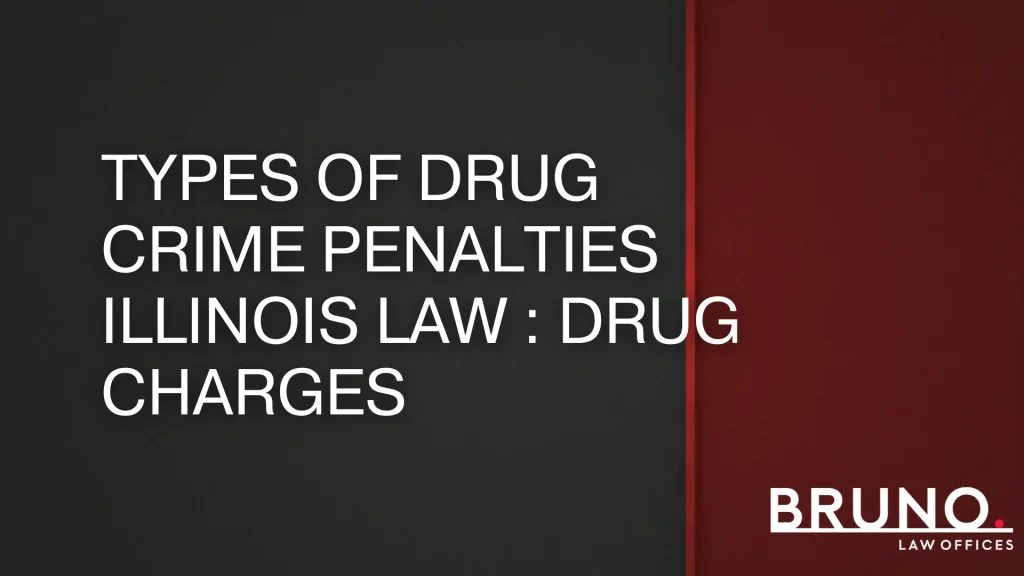Posted on Thursday, May 1st, 2025 at 9:00 am
Drug charges in Illinois can carry serious consequences, even for a first offense. Whether the charge involves possession, delivery, or trafficking, it is crucial to understand how the state approaches these cases and what the penalties may be. Below is an overview of how different types of drug crimes are classified and punished under Illinois law. Understanding drug crime penalties in Illinois can help you see the serious consequences you may be facing—from fines and probation to lengthy prison time, depending on the type and amount of substance involved.
Illinois Drug Schedules and Classification
Illinois follows a five-tier schedule system to classify controlled substances. These schedules, modeled after federal guidelines, are outlined in the Illinois Controlled Substances Act and determine the severity of the penalty.
- Schedule I drugs include substances with no accepted medical use and high potential for abuse, such as heroin, LSD, and ecstasy.
- Schedule II drugs include highly addictive substances with limited medical use, such as cocaine, methamphetamine, and oxycodone.
- Schedule III through V drugs decrease in abuse potential and include medications like codeine combinations, Xanax, and other prescription drugs.
Drug classification plays a direct role in the potential sentence. A charge involving heroin or cocaine, for example, will likely result in harsher consequences than one involving a lower-schedule drug.
Drug Possession Penalties in Illinois
Possession penalties depend on the drug’s schedule and the amount involved. Illinois does not treat all drug possession charges the same.
For example, under Illinois drug possession laws, having less than 15 grams of cocaine is a Class 4 felony punishable by up to three years in prison and fines of up to $25,000. However, larger quantities can lead to Class 1 or Class X felonies, which carry a potential prison sentence of up to 50 years.
Possession of heroin follows similar guidelines. A conviction for heroin charges in Illinois, even at the lowest level, starts as a felony.
Marijuana possession laws and Illinois drug laws changed significantly after legalization, but limits still apply. Possessing more than 30 grams of cannabis can result in criminal charges.
Not everyone qualifies, but Illinois offers diversion programs like the Illinois Drug Court. Those with prior convictions or large amounts of illegal drugs may not be eligible.
Misdemeanor Drug Offenses in Illinois
Although many drug charges are felonies, certain offenses qualify as misdemeanors, especially for cannabis or prescription drugs.
For instance, possessing less than 10 grams of marijuana is now a civil violation with a fine, but possessing more than 10 grams and up to 30 grams is a Class B misdemeanor, punishable by up to six months in jail.
Unlawful possession of certain valid prescription medications, like Xanax, may also result in misdemeanor charges if the quantity is low and no aggravating factors apply.
Even though these charges are less severe than felonies, they can still carry long-term consequences, including a criminal record, fines, and restrictions on employment or housing opportunities.
Drug Manufacturing, Delivery, and Trafficking Penalties
Penalties escalate when the charge involves making or distributing drugs. The Illinois Criminal Code treats delivery and manufacturing far more harshly than simple possession.
Drug distribution penalties depend on the substance and quantity. For instance, delivering one to 15 grams of cocaine can lead to a Class 1 felony, which carries a sentence of four to 15 years. Larger quantities may result in a Class X felony, which does not allow for probation and includes mandatory minimum drug sentences.
Manufacturing methamphetamine, even in small quantities, is treated as a felony and often comes with enhanced charges, primarily if it occurs near schools or parks or involves minors.
Drug trafficking charges in Illinois involve transporting controlled substances into the state with the intent to deliver. This offense doubles the minimum prison sentence associated with manufacturing or delivery, meaning a 15-year minimum could be increased to 30 years if trafficking is involved.
Aggravating factors, such as the presence of firearms or prior convictions, can turn an already serious case into an aggravated drug offense, raising the penalties even more.
Please read more about the new implementation procedure regarding the drug campaign here: Urbana implements new procedure to catch drug dealers.
Accused of a Drug Crime in Illinois? Get Legal Help Now
Drug charges in Illinois can lead to grave consequences, and even lower-level offenses may carry long-term effects. Whether the charge involves possession, distribution, or something more severe, it is vital to understand the law and what you may be facing clearly.
If you or someone close to you has been charged with a drug-related offense, having experienced legal representation matters. Bruno Law Offices has spent decades defending individuals across Illinois and knows how to approach complex drug cases. Our team is here to help you understand your rights and take the first step toward securing the necessary benefits. You can contact us through our contact form or explore our information on drug-related offenses in Illinois to learn more. For direct help, call (217) 328-6000.
